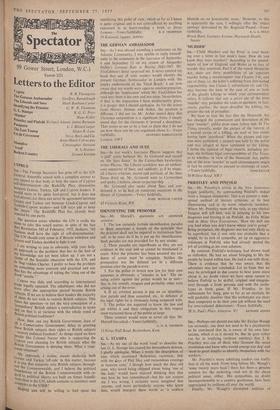PRIESTLEY AND I'INFOLD
Sts,—Mr. Priestley's article in the New Statesman .n .
bega justifiably, by approaching Pinfold's ordeal
from a Jungian standpoint, This is at present a wide- spread method of literary criticism, at its best illuminating and at its worst relatively - harmless. Where Mr. Priestley went off the rails, as any clerical Jungian will tell him, was in jilinping Co his own diagnosis •and forcing it on Pinfold. As Felix Milne said in Mine Own Executioner, 'How the hell can you lead when you don't know where you're going?' Being premature, the diagnosis was not only likely to be superficial, but it was only too probable that it would, by its lack of sympathy, set up an aggressive resistance in Pinfold, who had already started the job of arriving at-his own solution.
By contrast, Pinfold's technique had shown itself as orthodox. He had set about 'bringing to life the people he found within him. He had it out with them. There is evidence that he was aware that the adventure was not concluded. Let us hope that we may be privileged in due course to hear some more about it, no doubt (since we have some reason to believe Pinfold to be skilful, original and imagina- tive) through a fresh persona and with the arche- types in fresh guise, If Mr. Priestley, in his enthusiasm for Jung, gets as far as an analysis, he will probably discOver that the archetypes are more than competent to do their own job without the need for over-rational didacticism.—Yours faithfully,
26 St. Paul's Place, Islington. NI RICHARD ADAMS
































 Previous page
Previous page